Socket.IO makes real-time web applications powerful, but debugging these connections can be challenging. Finding the right tools can save you hours of frustration when tracking down issues in your Socket.IO implementations.
Here's my curated list of 6 completely free tools that will make debugging Socket.IO applications much easier in 2025. Whether you prefer browser-based solutions, command-line interfaces, or integrated environments, there's something here for every developer's workflow.
1. Apidog
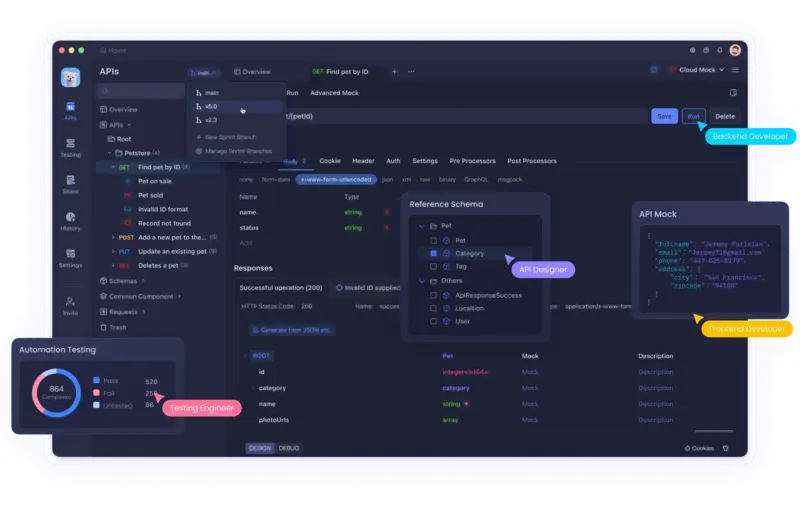
Apidog has emerged as a complete API development tool with robust Socket.IO support built right in. It allows developers to quickly connect to Socket.IO servers, supports different client versions, and provides an intuitive interface for sending and receiving messages.
What makes Apidog stand out is its comprehensive approach to API development. You can manage Socket.IO connections alongside your HTTP APIs, making it ideal for teams handling large projects with multiple communication protocols. The free plan offers enough functionality for most Socket.IO debugging needs, though advanced collaboration features are available in paid tiers.
Pricing: Free plan available, paid plans for advanced features
Link: https://apidog.com
2. WebSocket King
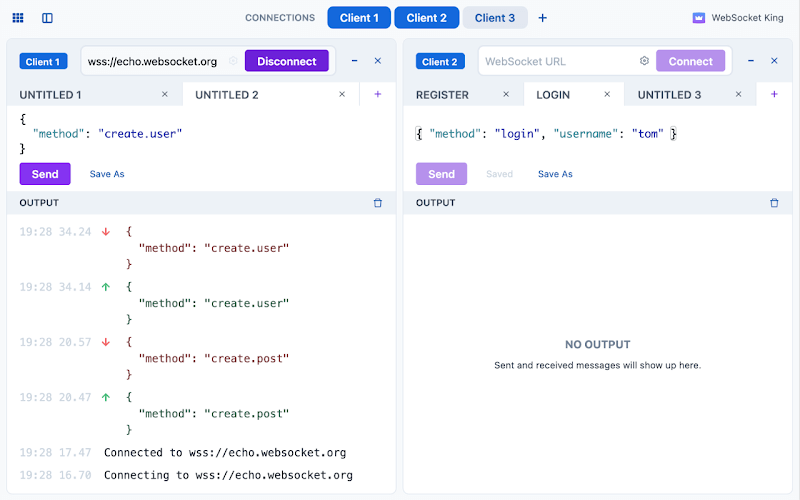
WebSocket King offers a straightforward browser-based debugging experience with no installation required. Developers simply enter a server address and can immediately start simulating client behavior and monitoring message logs.
The clean interface makes it easy to track communication between client and server, with message history displayed in a readable format. While it lacks team collaboration features, WebSocket King excels at quick, no-fuss debugging sessions when you need to isolate Socket.IO issues quickly.
Pricing: Free
Link: WebSocket King
3. Socket.IO Test Client
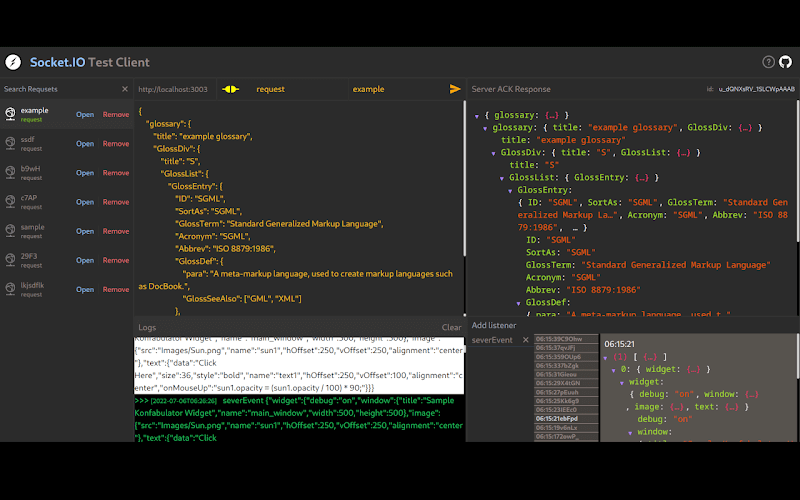
This handy Chrome extension brings Socket.IO testing capabilities directly to your browser. It supports multiple Socket.IO versions and provides a convenient way to test connections without switching between applications.
The extension logs all interactions with timestamps, making it easier to trace the flow of events during debugging. While it lacks some advanced features of standalone applications, it's perfect for front-end developers who want quick access to Socket.IO testing tools without disrupting their workflow.
Pricing: Free
Link: https://chrome.google.com/webstore/detail/socketio-test-client
4. Postman
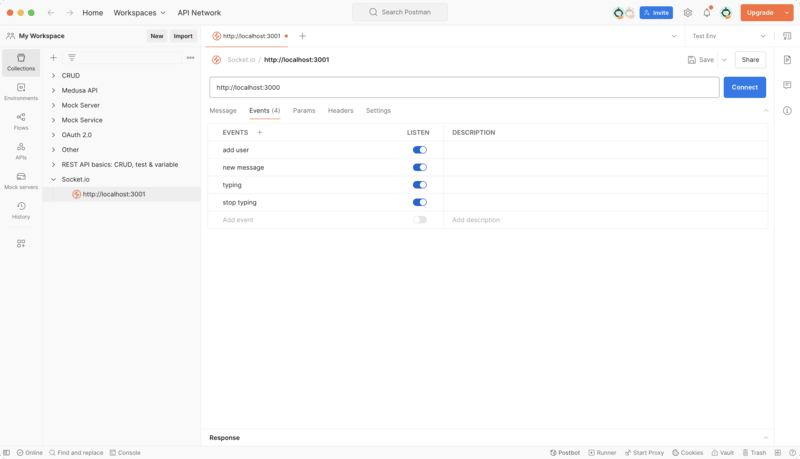
(image source: Alibaba cloud visitor)
While primarily known for REST API testing, Postman has expanded to support WebSockets, including Socket.IO. This versatility allows developers to test WebSocket and HTTP connections in one unified environment.
Postman's ability to save and share test cases makes it valuable for team environments. The WebSocket features in the free plan provide adequate functionality for basic Socket.IO debugging, though some advanced automation features require paid subscriptions.
Pricing: Free plan available, paid plans for advanced features
Link: https://www.postman.com
5. Smart WebSocket Client
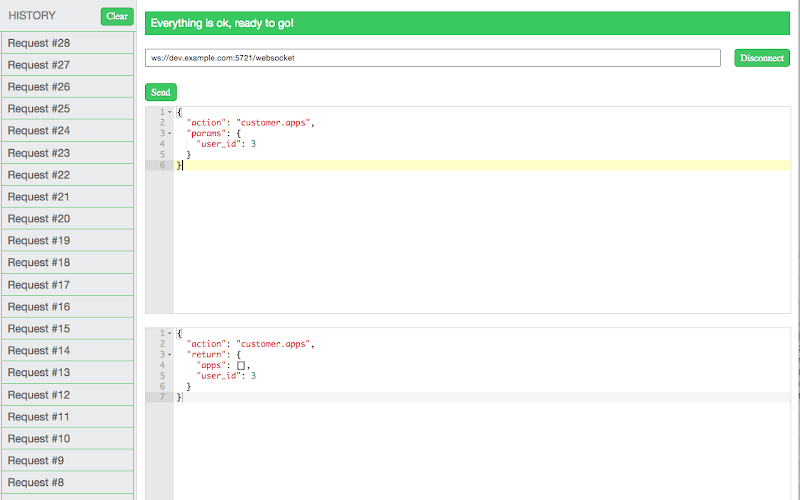
This lightweight tool supports both standard WebSockets and Socket.IO connections. Developers can enter a WebSocket URL and begin sending messages instantly, with minimal setup required.
Smart WebSocket Client focuses on simplicity and speed, making it perfect for straightforward debugging tasks. While it doesn't offer the comprehensive feature set of larger applications, its streamlined interface excels at quick connection verification and basic event testing.
Pricing: Free
Link: https://smart-websocket-client.com
6. Wscat
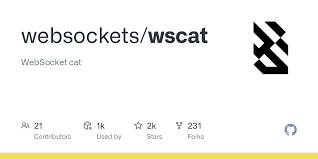
For developers who prefer command-line interfaces, Wscat provides a powerful CLI tool for testing WebSocket and Socket.IO connections. It allows developers to send and receive messages directly from the terminal, integrating seamlessly with scripting and automation workflows.
While it lacks the visual feedback of GUI applications, Wscat offers unmatched speed and efficiency for those comfortable with command-line tools. It's particularly valuable for server-side developers and those working in environments where graphical interfaces aren't available.
Pricing: Free
Link: https://github.com/websockets/wscat
Conclusion
The right Socket.IO debugging tool depends on your specific needs and workflow preferences. Browser extensions like Socket.IO Test Client offer convenience, while comprehensive platforms like Apidog provide more advanced features. Command-line enthusiasts will appreciate Wscat's simplicity, while WebSocket King offers a good balance of features and ease of use.
Best of all, you can try every tool on this list without spending a cent. Each offers unique strengths that might make it the perfect fit for your development process. With these resources in your toolkit, Socket.IO debugging becomes significantly more manageable in 2025.



